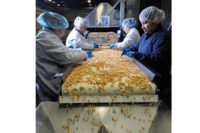
By Marina Mayer
Ever since Michael Season’s and Mexi-Snax merged to form Natural Snacks, LLC three years ago, the Addison, Ill.-based company has blossomed into a national player for better-for-you snacks.
Its lineup of reduced-fat and wheat- and gluten-free crisps, puffs, curls, tortilla chips and potato chips help boost the $10 million-plus company to a leading spot in the natural foods arena and helped the snack company nabSnack Food & Wholesale Bakery’sSnack Company of the Year award.
With a lineup that included a slew of new products along with a new plan-of-attack to extend the brand’s reach, the maker ofMichael Season’sandMexi-Snaxbranded snacks isn’t letting the change of seasons interfere with its plans.
“In the past year, we’ve re-made ourselves, we’ve re-created an image for ourselves and we redesigned our packaging,” says Michael Season, founder of the company. “This year, we’re going to focus on trying to expand our distribution into new points and build on the success we have.”
That’s why Season works closely with the three plants that produce his products to ensure that each chip, puff and curl meets the all-natural, wheat- and gluten-free claims.
Snack Food & Wholesale Bakery was invited to tour the 450,000-sq.-ft. state-of-the-art plant in Perham, Minn., that pumps out nearly 450,000 lb. of baked potato chips, multigrain chips, puffs and curls per week, among other snacks - and those numbers continue to grow.
“The puffs and curls are our fastest growing category,” Season says.
To produce 1,000 lb. of puffs per hour, raw corn enters a mixer and is hydrated with water, then passes through an extruder, where a knife spins to cut the dough into its puff shape.
The dough then travels downstream into the oven where it bakes at 350°F for two minutes. Then it enters a tumbler where wet cheese and oil, or slurries, are pumped through rubber pipes and sprayed onto the puffs.
They then travel into a second tumbler where the puffs receive a double application of cheese, this time in a dry format.
After the puffs are soaked in cheese, they move along a 24-ft. conveyor into the packaging room.
Meanwhile, the baked potato crisp line starts with dehydrated potato flakes, which are mixed with five minor ingredients, and then are hydrated and ground into dough that’s sheeted out on to two big rollers and then cut via a cookie cutter-like prong.
After the crisps are cut, they travel along the belt conveyor into the oven where they bake at 600°F for seven minutes. Then they receive a light spray of oil and dry application seasoning before traveling through the tumbler and into the packaging room.
The multigrain chip line consists of a similar process. First, raw ingredients enter the mixer and are hydrated with water. They then pass through the extruder and are cut into pre-determined shapes.
Next, the pieces enter the hopper where they are sprinkled with seasoning before being baked to remove moisture and are cooled as they are conveyed into the packaging room.
All four lines move along side-by-side into a form/fill/seal machine in the packaging room, and are packaged 12 to a box, casewrapped and then shipped out.
Organic corn meal and other ingredients used for the puffs, curls and chips come in totes and 50-lb. sacks.
To maintain the integrity of the products, the plant’s overhead vacuum-type ventilation systems assist in controlling drifting from different flavored or allergen seasonings.
The Perham operation is working to meet the requirements of the British Retail Consortium (BRC) as a part of the Global Food Safety Initiative guidelines by the end of this year and is inspected by the American Institute of Baking and vendor audited on a monthly basis.
Additionally, the facility has six Hazard Analysis and Critical Control Points (HACCP) programs with one metal detector for each line. The HACCP team leader is current with HACCP Alliance certification and is responsible for creating and implementing a document training program that meets BRC requirements. In fact, all 650 employees have received orientation training for food safety and are in line to be certified by the end of the year. To further ensure the quality and consistency of its products, the plant also has a food scientist and a food safety and quality director on site.
Heading West
While the Minnesota plant accounts for 30% of Natural Snacks’ sales, the 113,000-sq.-ft. plant in Dayton, Ohio, which also produces Michael Season’sbrand products, accounts for 50% of the company’s sales just by producing theThin & Crispyreduced-fat potato chips.
TheThin & Crispy line is made on a patented proprietary system that uses a conventional cooker, and produces about 2,500 lb. of product per hour, Season says.
The line is equipped with a scanning eye that reads the fat content as the chips travel out of the cooker. If the fat content is incorrect, a gate on the line shifts the conveyor over to the packaging room into a different section of the plant where operators closely monitor the product until it meets the claims, Season adds. Lab operators also manually test for fat and oil content, texture and more on an hourly basis, and send out samples to an independent lab for additional testing.
In this plant, the packaging also undergoes strict metal detection. A PLC monitor scans each finished bag for metal scraps and rejects any bags that don’t produce perfect scores.
“I think it’s significant in how much quality control and effort goes into [this process] to make sure that we meet those standards,” Season says.
On the other hand,Mexi-Snax brand snacks are produced in a 110,000-sq.-ft. Madera, Calif., plant, which has improved significantly over the last couple of years, Season says. For example, it added jacketed kettles to cook the corn, implemented a rotation policy for sharpening the stone to make stone-ground tortilla chips and incorporated several quality control checks along the lines.
“Quality and consistency is really [the No. 1 thing],” Season says. “What we’ve achieved in quality control has added to the end result of having a more consistent product on an ongoing basis.”
After production is complete from all three plants, the products are shipped to the Addison, Ill., headquarters, which also is home to a 10,000-sq.-ft. warehouse. Inventory turns 25 times a year and is picked up by common carriers and distributors through two bays and a drive-up door.
A combination of new products, all-natural ingredients and a knack for success ensures that Natural Snacks will continue to be a powerhouse for better-for-you snacks for years to come.


